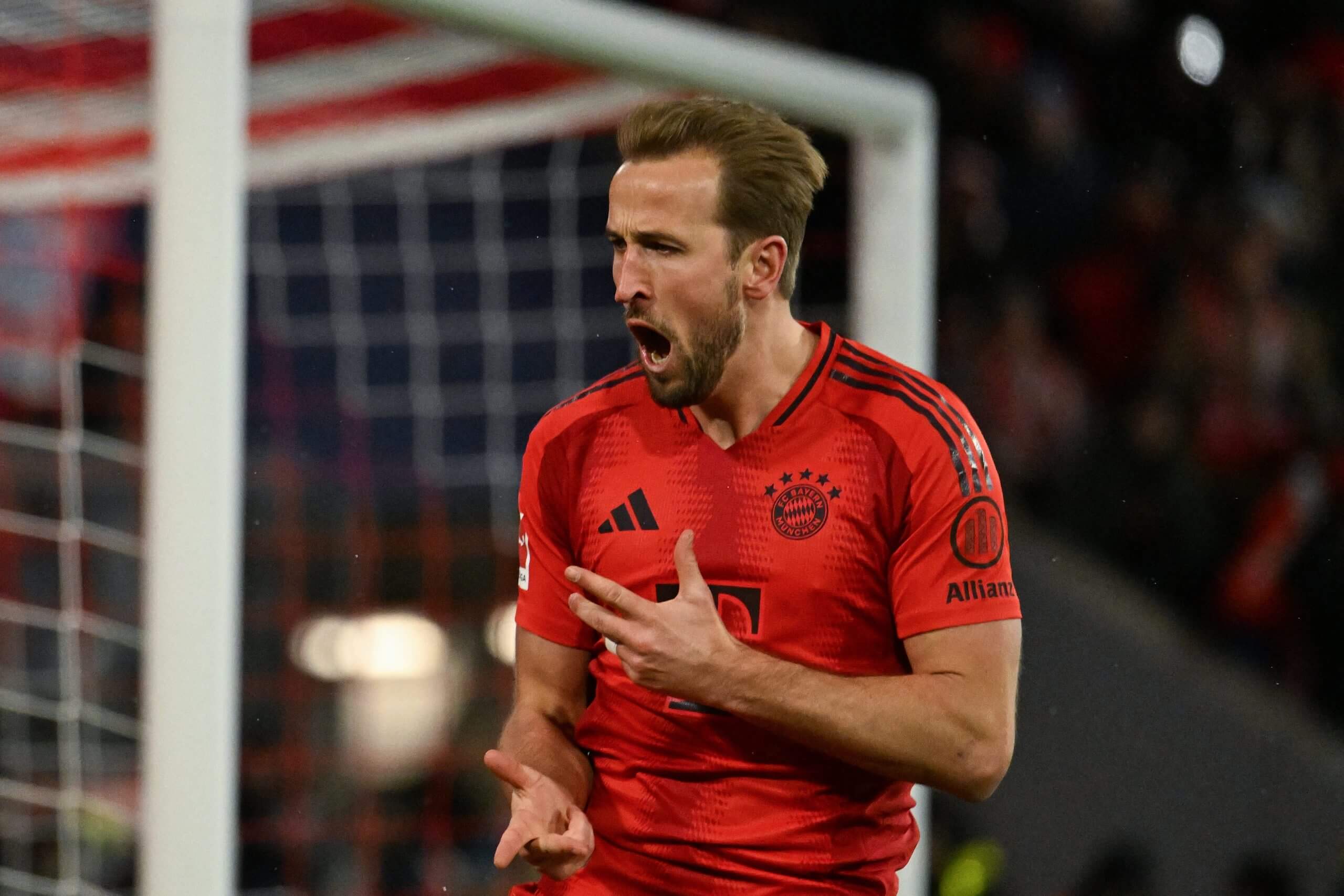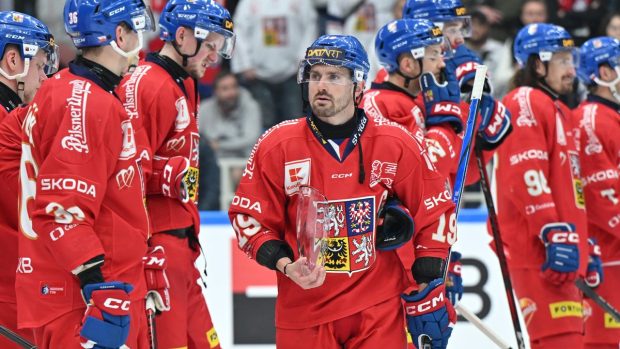
Bayern Munich have won the Bundesliga title, marking the first major trophy of Harry Kane’s career.
Bayern missed the chance to win the title — a 12th in the last 13 years — on the field on Saturday when Yussuf Poulsen snatched a stoppage-time equaliser for RB Leipzig in a 3-3 draw.
But Leverkusen’s failure to beat Freiburg on Sunday means Bayern now have an unassailable eight-point lead at the summit with two games of the season remaining.
Advertisement
Leverkusen recovered from 2-0 down to salvage a 2-2 draw at the Europa-Park Stadion thanks to Jonathan Tah’s 93rd-minute equaliser, but they could not find a winner and their dropped points cued title celebrations in Munich.
Leverkusen had ended Bayern’s era of dominance in Germany last season, topping the Bundesliga in an unbeaten domestic campaign to halt Bayern’s run of 11 successive German titles. Xabi Alonso’s side also won the DFB-Pokal.
Bayern responded by appointing Vincent Kompany as head coach last summer, after he had overseen Burnley’s Championship-winning campaign in 2022-23 and their subsequent relegation.
The trophy is the first of striker Kane’s 16-year professional career, having never won a title with Tottenham Hotspur or at international level with England despite the goalscoring records he set, while also missing out on success in his first season at Bayern.
While Bayern have won the league title, they exited the Champions League at the quarter-final stage to Inter and were beaten in the last-16 of the DFB-Pokal by Leverkusen in December.
Calm Kompany, mighty Upamecano, awesome Olise: How Bayern did it
Bayern Munich are not back to where they were in the middle of the last decade; they have not attained that level of dominance this season, nor have they been a force in European football this season.
Nevertheless, 2024-25 has been a clear improvement. Most importantly, they are German champions again. Bayer Leverkusen were diminished, but they are still an extremely talented side and the most powerful rival Bayern have encountered in recent years — and they have been held off relatively easy.
But it is the smaller details that speak to Vincent Kompany’s impact on this side and the overall worth of the campaign.
Should they win their remaining two games, they will record their highest points total since 2020. They also have a chance of scoring more than 100 league goals in a season for the first time in five years.
Advertisement
The atmosphere around Bayern has seemed calmer, too, and more conducive to progress since Kompany arrived. The turbulence of the Thomas Tuchel era is a memory, as are the many skirmishes that took place in front of the national media. The Belgian has been politically astute and has never stepped outside the boundaries of his job; being deferential is such an important and yet understated trait.

Kompany joined Bayern in the summer of 2024 (S. Mellar/FC Bayern via Getty Images)
He has “got it” — he has understood the social aspect of being Bayern coach in a way that some of his predecessors did not. His handling of the media has often been admirable, too. The big beasts of the German press are always ready to seize on a negative story, a lapse in form or some kind of controversy, but — while there have been a few of those — none of them have been Kompany’s doing.
On the pitch, individual improvements speak for Kompany’s work. Jamal Musiala had his most productive season, despite it ending early because of injury. Joshua Kimmich was often excellent after returning to midfield. Dayot Upamecano emerged as a mighty defender among a group of players who needed that example.
And Michael Olise was an outright triumph. Bayern may have paid a lot of money for Olise, but upon his arrival in the Bundesliga few thought him capable of having the kind of impact that he ultimately has. As it is, he has a strong claim to be the Bundesliga’s player of the year.
Perhaps the best way to characterise this year is as the first of several steps back to Bayern’s best. It has arrested the decline — which, based on performance data, began several years before Bundesliga dominance finally ended — and pointed the club’s nose upwards. There is more progress to make and there are also signings necessary in the summer, but the platform from which they will do that is now much stronger.
Harry Kane: Bundesliga champion
Finally, Harry Kane has the first major trophy of his career. At 31 and after nearly 600 club games, he is a league champion.
Kane’s time in Germany has been unusual. He arrived from Tottenham already a star. In an era during which the Bundesliga finds it increasingly difficult to attract elite players in mid-career, that has made Kane an anomaly.
Advertisement
It has also made him a target. The novelty of Kane in Germany lasted just a few months with the local media, with the volume of his goalscoring becoming secondary to deeper questions surrounding the types of goals he was scoring and who he was scoring them against. Were there too many penalties? Perhaps too many easy afternoons against Bochum, Holstein Kiel and Darmstadt?
Those questions have never gone away. The disparities that exist between the Bundesliga clubs also make them unavoidable. Stat-padding is a pre-requisite, not a weakness.
Winning the Bundesliga will not change that, either, and once this success fades, there will still be muttering about Kane’s worth in split-second moments, and complaints about the chance he pushed against the post in first leg of the Champions League quarter final against Inter Milan.
It’s not unique to him. Those are the standards at Bayern and every centre-forward who has played for them during this modern era has had to live with them. But less appreciated is Kane’s contribution of 60 goals in 61 league appearances. In his first season, his scoring rate survived a lot of dysfunction and a Bayern team which was not any better than their third-placed finish suggested. A forward who was less capable of contributing to the attacking play as a whole would have suffered far more and allowed Bayern’s broken mechanics to be even more visible.

Kane has won the Bundesliga in his second season in Germany (Lukas Barth-Tuttas/AFP via Getty Images)
This season, he has been used differently again. Kane’s receiving points have been deeper and he has been employed as part-goalscorer, part-creator, part-possession forward. He has been embedded within the team structure in a way that, for instance, Robert Lewandowski never was and never could be, and used as a means of compensating for weaknesses elsewhere in the side.
Yes, he has had difficult periods over the past eight months — the week where he failed to score against Eintracht Frankfurt, Aston Villa and Bayer Leverkusen was treated as a crisis — but the context is that Kane’s contribution has never, at any stage of his career, depended solely on his ability to change the score.
There has been worth to Kane in the symbolic sense, too. Relative to their own history, Bayern find themselves short on stars. Jamal Musiala is an astonishing player, and Joshua Kimmich, Manuel Neuer, and Thomas Muller remain icons of German football, but few players in this squad would trouble any World XI. Michael Olise is on the fringes, perhaps, and a fit Alphonso Davies would be in the conversation, but nobody else.
Advertisement
At this stage of his career, Kane probably does not make that list, either, but he remains outstanding in many ways. There is value in Bayern having had that top class player at this point in their history. He has been a source of goals, but also reassurance — one of those players Bayern can put on the pitch to remind their opponents of their superiority.
Think back to the Champions League last-of-16 tie against Leverkusen. Bayern were 5-0 winners partly because of Kane’s goals — one in each leg — but also because they were Bayern Munich and Bayer Leverkusen were not. Xabi Alonso’s side wilted under the lights, succumbing to that sense of inevitability that exists within big German footballing occasions. When it matters, Bayern win — ask Borussia Dortmund.
That power has been on the blink over the past few years. Kane has allowed it to retain just enough wattage during this transitional period.
Questions will always be asked of the England captain’s career path. Did Kane spend too long at Tottenham? Could he have moved to a superclub earlier in his career, with less football in his legs? Perhaps, but those are different arguments, for a different day.
Now, what matters is that he has the medal his career has deserved.
(Photo of Harry Kane after Saturday’s draw at RB Leipzig: Maja Hitij/Getty Images)
This news was originally published on this post .










Be the first to leave a comment